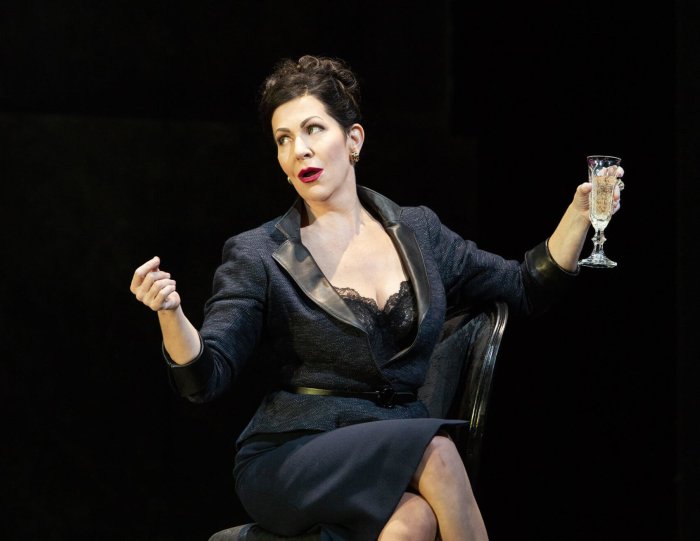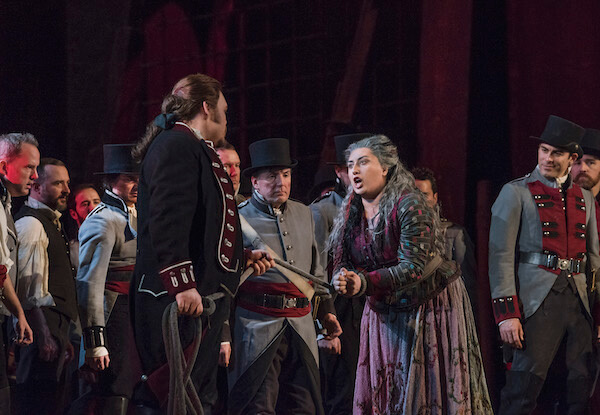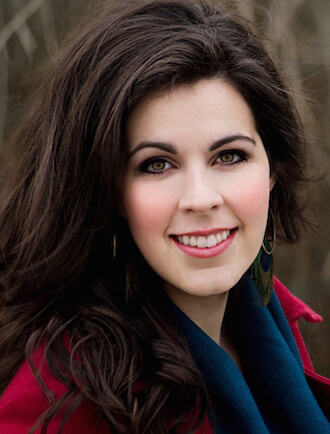Evelyn Herlitzius as Kundry, Klaus Florian Vogt in the title role, and René Pape as Gurnemanz in Wagner's “Parsifal.” | KEN HOWARD/ METROPOLITAN OPERA
It’s a real if rare pleasure to walk out of the Metropolitan Opera thinking, “That was an extraordinary performance, worthy of the company’s highest legacy.” I felt that after — and indeed during — February 20’s “Parsifal.” Wagner’s final opera deals meaningfully in redemptive miracles; above all what mattered here was Yannick Nézet-Séguin’s luminous, detailed take on the testing, gorgeous score, with its sublime architecture and choral depth. The gifted (and mercifully out) Canadian conductor, whose status as music director was just accelerated to begin next season, got and transmitted the specialness of “Parsifal” the first time out.
Plus François Girard’s unhackneyed 2013 production, simplified and improved in focus in this restaging, held up beautifully. Michael Levine’s sets for the two outer acts were spare yet magically transformed by David Finn’s lighting and Peter Flaherty’s videos (deserts, heavenly bodies). The intervening Klingsor Act, with its unsubtle vaginal symbolism and tacky costumes, at least furnished as comparable a contrast as the (relatively) cheesy music of the evil magician — roughly but aptly delivered by Evgeny Nikitin, in improved German — and his Flowermaidens. Act Two’s thwarted seduction scene also held some challenges for Evelyn Herlitzius, a Kundry singularly lacking in plush tonal resources, and Klaus Florian Vogt’s short-breathed title hero, who did better in floatier passages. But the soprano’s dramatic commitment fueled some thrills (the tenor kind of coasts by on Aryan looks, but that works in this part) and she summoned up more legato solidity than she had on previous broadcasts. Peter Gelb’s plans to utilize her unorthodox talents as the “Frau ohne Schatten” Amme sound justified.
“Parsifal,” “Pagliacci,” and the Like, Please
The central performances held over from 2013 — René Pape’s lyrically approached, unusually (for this artist) committed Gurnemanz and Peter Mattei’s gorgeously sung, wrenchingly enacted Amfortas — must rank among the finest operatic assumptions of our day. Alfred Walker made a very solid Titurel, and one noted Ian Koziara’s incisive Fourth Sentry and Haeran Hong’s limpid First Flowermaiden. A deeply moving and inspiriting performance.
On January 8, the Met revived yet another David McVicar production: the founding dual pedestals of verismo , “Cavalleria rusticana” and “Pagliacci.” As when the staging appeared in 2015, the Leoncavallo backstage drama emerged amusing as well as exciting. The Mascagni tragedy preceding it remains one of the current Met’s weakest shows: a drab, needlessly dark “community ritual” style exercise, carried out largely in darkness contradicting the music (and the story’s Sunday morning setting). Santuzza’s blocking is inert; by contrast, the set revolves pointlessly and Andrew George’s ludicrously inapposite wannabe Brooklyn hipster choreography for a trio upstaging Alfio’s entrance music remains in place — one of the silliest things on view on any New York stage.
But the evening wasn’t wasted. Roberto Alagna appeared in both leading tenor parts, a feat he pulled off here in 2009. Turiddu has always been among the French/ Sicilian tenor’s more convincing roles, while Canio takes vocal resources he doesn’t really have — “Vesti la giubba” proved pretty perfunctory — but can finesse in his current leathery but forthright form. No one would mistake his sound for youthful, but he has plenty of vocal energy and still looks good onstage; he shows far more attention to shaping particular characters than his younger rival Vittorio Grigolo, showboating his way through the new “Tosca” staging.
As before, baritone George Gagnidze also appeared in both works, providing serviceable vocalism and routine.
Ekaterina Semenchuk is welcome back at the Met. She sang Santuzza’s incredibly difficult music with considerable accomplishment — many high notes soared aloft above ensembles — if with rather generalized dramatic involvement. It would take a Simionato or Cossotto to enliven McVicar’s passive take on the character. Aleksandra Kurzak (Nedda) retains trills and agility from her earlier high coloratura phrase; her enlarged voice remains attractive if somewhat lacking in evenness and dynamic shading. Playing opposite her real-life husband Alagna, Kurzak created a credible, rounded character.
Rihab Chaieb made the rare excellent Lola dramatically and vocally, and Andrew Bidlack’s Beppe (a shade too American in diction) sang and acted charmingly. It speaks poorly for the opera world that a scratch baritone like Alessio Arduini has made an international career based — one assumes — on youthful looks alone; he was utterly prosaic and tonally gray in Silvio’s gorgeous music.
Nicola Luisotti functions comfortably in the verisitic idiom — the orchestra never went off the rails — but he chose some mighty slow tempos along the way.
Dorothea Roeschmann’s Zankel/ Carnegie recital on February 13 with the sensitive, indefatigable Malcolm Martineau at the piano affirmed that the German soprano remains a singer to treasure. Since her lyric/ soubrette days at the Met, the timbre has darkened. Initially — in the first two Schubert “Mignon Lieder” — her tone sounded a trifle brittle, but it soon expanded into greater bloom. Given how fully she puts over the German texts, her fundamental use of legato is exemplary; she retains the ability to spin, even as occasionally she takes extra breaths in long lines.
The program included a stand-alone Schubert ballad, “Nachtstueck,” with its High Romantic aestheticized death; Mahler’s “Rueckert Lieder,” a rarish choice for soprano and notable for the sublime “Ich bin der Welt abhanden gekommen”; and Robert Schumann’s Mary Stuart poems —a fascinating cycle far more welcome than the omnipresent “Frauenliebe und –leben”, not least because the texts stem from an actual woman. All received thoughtful, musicianly treatment.
Curiously, when the program’s final set was reached — Wagner’s “Wesendocnk Lieder,” with their harmonic and melodic pre-echoes of “Tristan” — both artists yielded to exaggerated dynamics and overemphasis. But the three encores (Schumann, Liszt, Wolf) returned the crowd to the highest realms of Liederabend contentment. Thank goodness Carnegie continues to program high-level vocal recital events (flag Lawrence Brownlee and Myra Huang on April 24). Next season, Lincoln Center’s Great Performances has abandoned them.
A brief trip to Paris afforded a visit to the delightful, historic building of the Opera Comique — where I actually heard my first opera (as opposed to operetta) at the age of 11. Since then, the theater has undergone many regime changes. In the last few years, many important French operatic landmarks like “Marouf” and “Le pre aux clercs” have been unearthed, with fine casts. Genre-bending pastiche has also figured in the Op-Com’s plans.
Librettist and dramaturg Eric Reinhardt crafted “Et in arcadia ego” with director Phia Ménard using the works of Rameau to explore — in projected titles rich in painfully Gallic metaphysical tweeness about mortality, if with occasionally stunning images thanks to Menard’s “industrial elements” set (think huge Glad bags). Definitely not worthy of export, though it’s the kind of thing BAM and the Armory like to import on the basis of a few hip production photos.
This was just not good. I’ve rarely heard such savage booing for the production team in France. Had it been an unstaged concert, the evening would have been a triumph, as Les Talens Lyriques played brilliantly and bracingly under Christophe Rousset and the very theatrically graceful mezzo Lea Desandre sang with beauty and style. Watch for her rise.
David Shengold (shengold@yahoo.com) writes about opera for many venues.



































